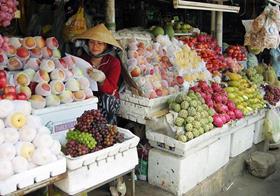
Vietnamese officials have called for tighter control of fruit and vegetable imports from China on the back of growing consumer concerns about food safety.
Speaking to local media on Friday at a seminar titled ‘How to control quality of imported fruits and foods’, Institute for Policy and Strategy for Agriculture and Rural Development (IPSARD) vice director Duong Ngoc Thi said the government needed to have more specific regulations to control the quality of produce crossing the border from China.
One example, he said, was the number of border crossings used to enter the country. Fresh produce imports are currently able to use any crossing along the border, which Duong said resulted in produce entering Vietnam via the smallest border crossings to dodge import taxes, reported the Saigon GP Daily.
“This is an issue and the ministry is compiling a new circular to be published in the second quarter of 2013, to clearly regulate which border gates are to be permitted to import fruit and vegetables,” he stated.
The lack of border controls extended from China to imports from Cambodia and Laos, added Nguyen Van Hoi, deputy head of the Ministry of Industry and Trade’s Mountainous Trade Department.
“We currently have no specific regulations to control food safety and hygiene for fruits and vegetables imported from China, Cambodia, and Laos,” he said. “Produce is often divided into small consignments in order to be continuously imported from China into Vietnam through unofficial channels every day.”
The shortage of facilities and staff to test food safety and quality at border crossings was one of the biggest challenges, Nguyen explained.
“Samples also take up to seven days to be sent to Hanoi for testing, and customs staff cannot hold trucks carrying the goods for a long time due to resultant jams at border gates.”
The seminar, jointly run by IPSARD – a think-tank for Vietnam’s Ministry of Agriculture and Rural Development – and the Vietnam Standards and Consumers Association, comes on the back of rising consumer concerns about food safety.
A recent survey by the Association of 1,200 people in six provinces found 95 per cent of consumers were worried about food safety, and fruits and vegetables were considered the most risky type of imported food.



